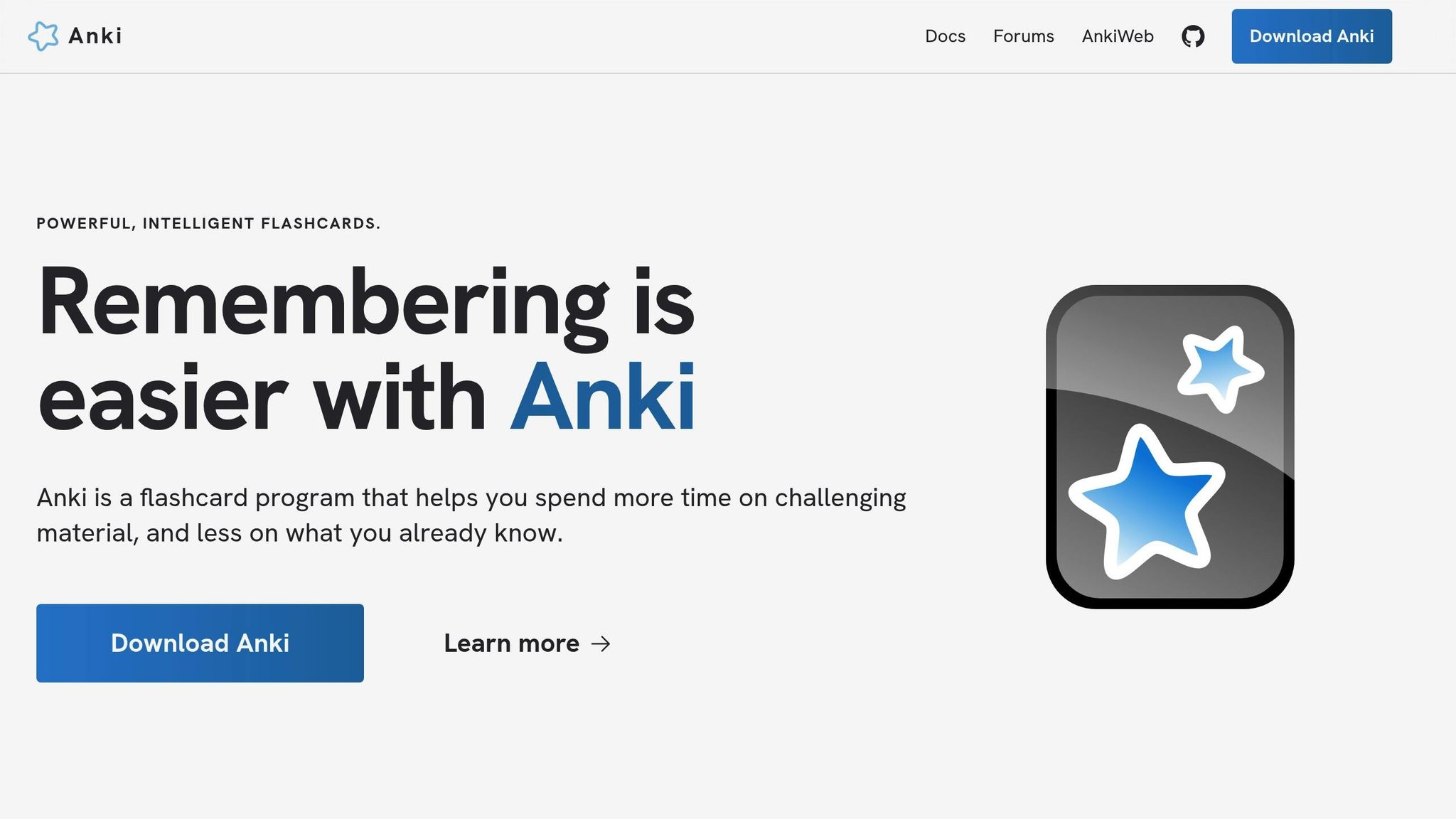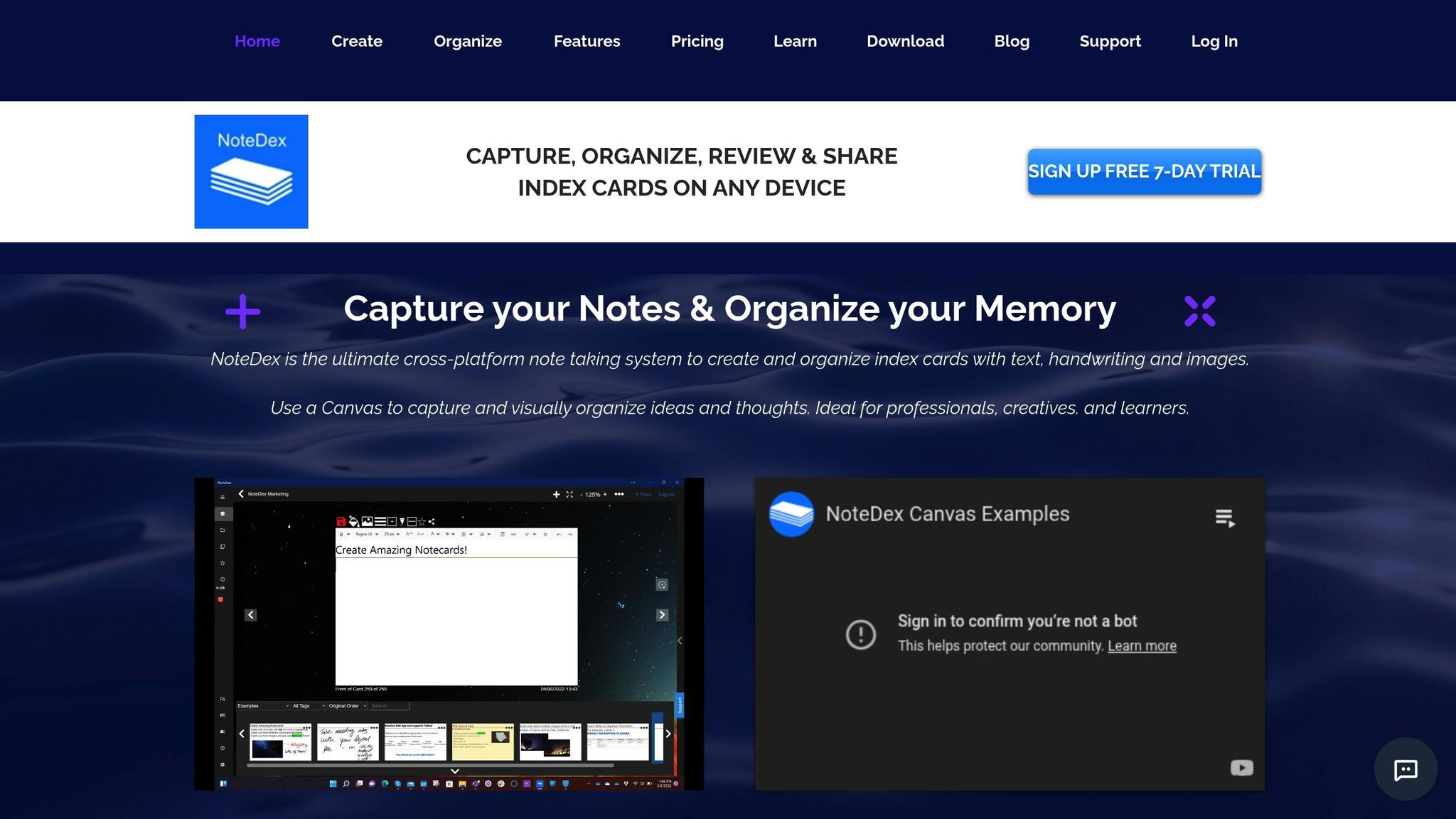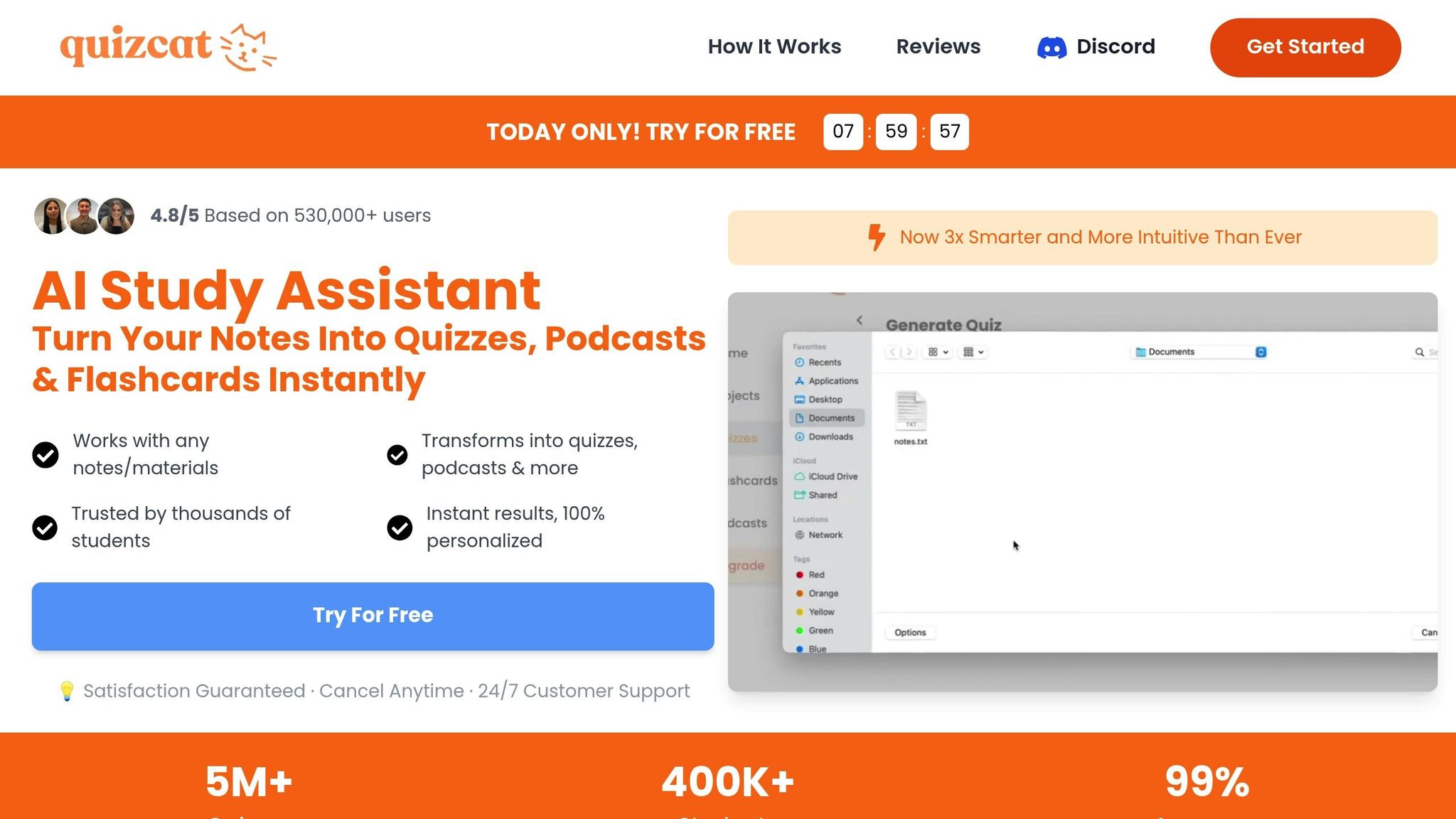
5 Flashcard Apps for Medical School Exam Prep
Preparing for medical exams can feel overwhelming, but flashcard apps simplify the process by breaking down complex topics into manageable pieces. Here’s a quick summary of five top flashcard apps to help you study smarter:
- Anki: Known for its spaced repetition system, perfect for retaining medical terms and concepts.
- Brainscape: Uses confidence-based repetition and offers pre-made medical decks.
- Quizlet: Features multimedia support and collaborative study tools.
- NoteDex: Great for drawing anatomical diagrams with handwriting recognition.
- QuizCat AI: AI-powered to turn notes into flashcards, quizzes, and audio lessons.
Quick Comparison
| Feature | Anki | Brainscape | Quizlet | NoteDex | QuizCat AI |
|---|---|---|---|---|---|
| Spaced Repetition | ✓ | ✓ | ✓ | – | ✓ |
| Image Support | ✓ | ✓ | ✓ | ✓ | ✓ |
| Audio Integration | Basic | – | ✓ | – | ✓ |
| Offline Access | ✓ | ✓ | Limited | ✓ | Limited |
| AI-Generated Content | – | – | – | – | ✓ |
Each app has unique strengths, so choose based on your study preferences. For AI-driven efficiency, QuizCat AI stands out, while Anki excels in spaced repetition. Ready to boost your exam prep? Let’s dive deeper into these tools.
Best Flashcard App: A Review of Anki, Quizlet, Flashcard Lab, Cram, and Brainscape

5 Medical School Flashcard Apps
Medical school is no walk in the park, and mastering anatomy and physiology can feel like scaling a mountain. Thankfully, there are apps designed to make the climb a little easier. Below, we take a closer look at five standout flashcard apps that can help medical students tackle complex topics with confidence.
Anki
Anki is a go-to for many med students, thanks to its robust spaced repetition system. This feature ensures you retain even the most intricate medical terms and concepts by revisiting them at optimal intervals. The app allows you to create custom decks, complete with detailed diagrams and explanations, making it perfect for personalizing your study sessions. While the interface might not win any design awards, its functionality more than makes up for it.
Brainscape
Brainscape brings a polished approach to flashcard studying with its confidence-based repetition system. This method helps you focus on areas where you're struggling the most. The app also offers a variety of pre-made medical flashcard decks, which are particularly useful for visualizing anatomical structures and understanding physiological processes. Its clean, organized layout makes it easy to navigate through large volumes of material.
Quizlet
Quizlet stands out for its collaborative features, allowing students to share and access peer-generated study sets. With its multimedia support - including images and audio - Quizlet is especially handy for visual learners tackling anatomy or medical procedures. The app’s diverse study modes, such as games and tests, keep things engaging while reinforcing key concepts.
NoteDex

If you’re a fan of drawing and handwriting your notes, NoteDex is worth checking out. This app shines with its drawing tools, making it ideal for creating and studying anatomical diagrams. It also works offline, which is a huge plus for students during clinical rotations or hospital shifts. The handwriting recognition feature even converts your written notes into searchable text, adding an extra layer of convenience.
QuizCat AI

QuizCat AI takes flashcards to the next level with its AI-driven content creation and audio learning features. This app converts your uploaded notes into interactive flashcards, quizzes, and even audio lessons - perfect for multitasking during gym sessions or commutes. With a 4.8/5 rating from over 530,000 users, it’s clear this app is making waves. QuizCat AI has already generated over 5 million quizzes and offers a 3-day free trial, with subscriptions starting at $9.99 per month.
"The flashcards are crazy good, but the podcast feature is my fave. It reads my notes back to me while I'm at the gym or driving. Talk about multitasking!" – Ethan Blake
Here’s a quick breakdown of QuizCat AI’s standout features:
| Feature | Benefit for Medical Students |
|---|---|
| AI-Generated Content | Turns notes into interactive flashcards, quizzes, and podcasts |
| Audio Learning | Converts notes into audio lessons for studying anywhere |
| Multi-Format Support | Works with files like PDF, DOCX, and TXT |
| Personalized Study Paths | Creates study materials tailored to your notes |
| Mobile Accessibility | Seamlessly syncs across devices - ideal for busy schedules |
With these innovative tools, QuizCat AI offers a unique edge. Now, let’s dive into how these apps compare in terms of their key features.
App Feature Comparison
Here’s a quick breakdown of how popular flashcard apps stack up for medical exam prep in anatomy and physiology.
Feature Chart
| Feature | Anki | Brainscape | Quizlet | NoteDex | QuizCat AI |
|---|---|---|---|---|---|
| Spaced Repetition | ✓ | ✓ | ✓ | – | ✓ |
| Image Support | ✓ | ✓ | ✓ | ✓ | ✓ |
| Audio Integration | Basic | – | ✓ | – | ✓ |
| Offline Access | ✓ | ✓ | Limited | ✓ | Limited |
| Drawing Tools | – | – | – | ✓ | – |
| AI-Generated Content | – | – | – | – | ✓ |
| Mobile App | ✓ | ✓ | ✓ | ✓ | ✓ |
| Collaborative Features | Limited | ✓ | ✓ | – | – |
| Note Import | ✓ | – | ✓ | ✓ | ✓ |
| Progress Tracking | ✓ | ✓ | ✓ | Limited | ✓ |
The table highlights each app’s core capabilities, but understanding their strengths and weaknesses is key to making the right choice. Below is a closer look at what each app offers.
Pros and Cons
Let’s break down the benefits and drawbacks of each app:
Anki
- Pros: Offers robust spaced repetition, extensive customization, and a strong user community for support.
- Cons: The interface can feel outdated, has a steep learning curve, and multimedia features are basic.
Brainscape
- Pros: Features an intuitive confidence-based learning system, pre-made medical decks, and a clean, simple design.
- Cons: Customization is limited, and it requires an internet connection to function.
Quizlet
- Pros: Known for its massive library of shared decks, multiple study modes, and an easy-to-navigate interface.
- Cons: The free version includes ads, and advanced features require a premium subscription.
NoteDex
- Pros: Great for anatomy students who need drawing tools, supports handwriting recognition, and works offline.
- Cons: Focuses less on traditional flashcard features and offers fewer study modes.
QuizCat AI
- Pros: Excels with AI-driven content creation, supports audio learning, and handles multiple file formats for note uploads.
- Cons: Requires an active internet connection to use effectively.
"Uploading my notes and instantly having quizzes ready feels like magic. This tool has completely changed the way I study. I actually feel prepared for once!" – Maya Johnson
QuizCat AI is particularly notable for its cutting-edge approach, delivering a 99% accuracy rate in generating content. With over 400,000 students using it and a stellar 4.8/5 rating from more than 530,000 users, it’s a game-changer for many.
Consider these features and trade-offs carefully to find the app that aligns with your study habits and goals.
sbb-itb-1e479da
Study Tips for Flashcard Apps
Using Multiple Apps Together
Mixing features from different flashcard apps can make your study sessions much more productive. Start with AI-generated content to create your study materials and then take advantage of additional features offered by other apps.
Here are some effective strategies:
- Content Creation: Upload your lecture notes to automatically generate flashcards or other study resources.
- Active Review: Use spaced repetition tools to ensure you're revisiting material at optimal intervals.
- Mobile Learning: Take advantage of audio features to study while commuting, exercising, or doing chores.
To get the most out of your study time, plan your reviews throughout the day instead of cramming them all at once.
Study Schedule Tips
Incorporating flashcard apps into your daily routine can be a game-changer, especially in medical school. Here are some practical ways to make it work:
Morning Commute: Turn travel time into study time. As Olivia Brooks shares:
"I can listen to my notes like a podcast on the bus - so convenient! My friends are all using it now too."
Exercise Integration: Combine your workout with study sessions by using audio flashcards or quizzes.
Time-Block Strategy:
| Time of Day | Study Activity | Duration |
|---|---|---|
| Morning Commute | Audio Review | 30 mins |
| Lunch Break | Quick Quiz | 15 mins |
| Study Sessions | Active Flashcard Review | 45 mins |
| Evening Walk | Audio Review | 20 mins |
Spreading your flashcard reviews throughout the day helps with retention and reduces the stress of cramming. Jake Harrison, a second-year medical student, highlights how flashcard apps have streamlined his studying:
"Literally a lifesaver during finals. Uploaded my notes, hit 'create,' and BOOM - quizzes and flashcards ready to go. It's like having a personal tutor 24/7."
The secret to success lies in consistency. Use these tools to study smarter, not harder, and watch your learning efficiency soar.
Summary
Flashcard apps have changed the game for medical exam prep, making it easier for students to grasp intricate topics in anatomy and physiology without wasting time.
One standout tool is QuizCat AI, boasting a 4.8/5 rating from over 530,000 users. This app takes study materials and instantly turns them into interactive flashcards, quizzes, and even audio lessons - a huge win for time-strapped medical students.
"Uploading my notes and instantly having quizzes ready feels like magic. This tool has completely changed the way I study. I actually feel prepared for once!" – Maya Johnson
Here’s a glimpse at some impressive stats that highlight its impact:
| Metric | Achievement |
|---|---|
| Total Users | 400,000+ students |
| Quiz Generation | 5M+ quizzes created |
| Accuracy Rate | 99% |
| Daily Sign-ups | 5,300+ (as of May 12, 2025) |
These numbers speak volumes about how effective QuizCat AI is at simplifying exam prep. Unlike other apps, it combines AI-driven content creation with customizable study tools designed specifically for medical exams. This makes studying with flashcards not just efficient, but also more adaptable to individual learning needs.
FAQs
How does QuizCat AI help medical students study more effectively?
QuizCat AI simplifies studying by turning your notes and materials into interactive quizzes, flashcards, and even podcasts. These tools are perfect for reviewing important concepts, testing what you’ve learned, and pinpointing areas where you need extra practice.
Thanks to its AI-powered features, QuizCat AI tailors the study process to your needs, helping you stay on track and use your time wisely. Whether you're gearing up for exams or tackling tough topics, it’s built to make learning smarter and more effective.
How does QuizCat AI's podcast feature help students with busy schedules?
QuizCat AI's podcast feature transforms your study materials into audio content, making it easy to review essential concepts wherever you are. Whether you're stuck in traffic, hitting the gym, or juggling multiple tasks, this tool helps you turn downtime into productive learning time.
Designed with busy students in mind, it offers a flexible way to stay on track without being confined to a desk. The audio format is perfect for revisiting key topics and solidifying your understanding, even on your most hectic days.
How can medical students use QuizCat AI daily to improve their exam prep?
Medical students can integrate QuizCat AI into their daily study habits to boost their learning experience. By uploading their notes or study materials, they can instantly turn them into interactive quizzes, personalized flashcards, and even study podcasts.
Flashcards are perfect for quick reviews of key concepts, quizzes help assess understanding, and podcasts offer a convenient way to reinforce knowledge during commutes or breaks. This adaptable method allows students to zero in on weaker areas while making study time more productive and engaging.
